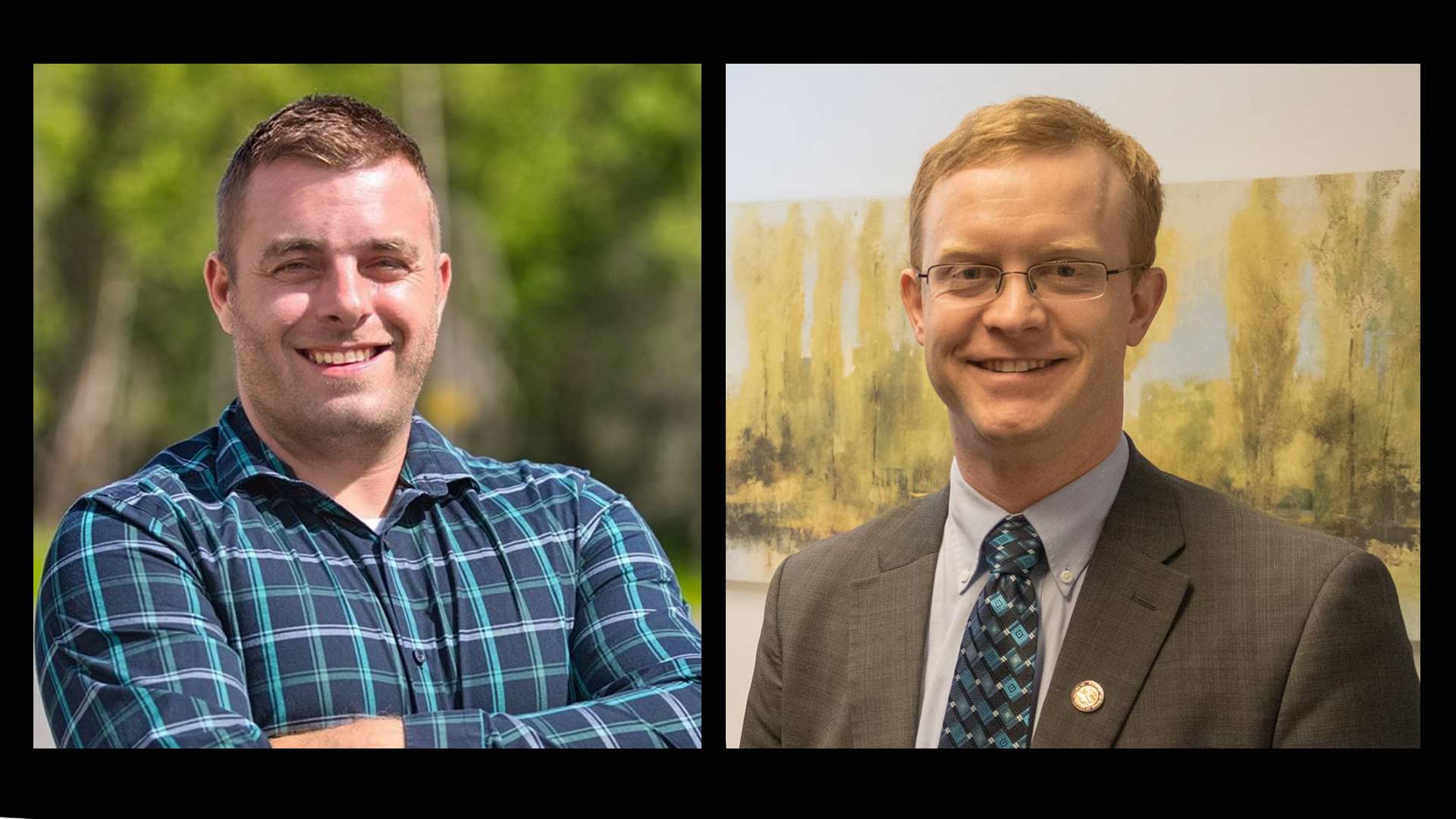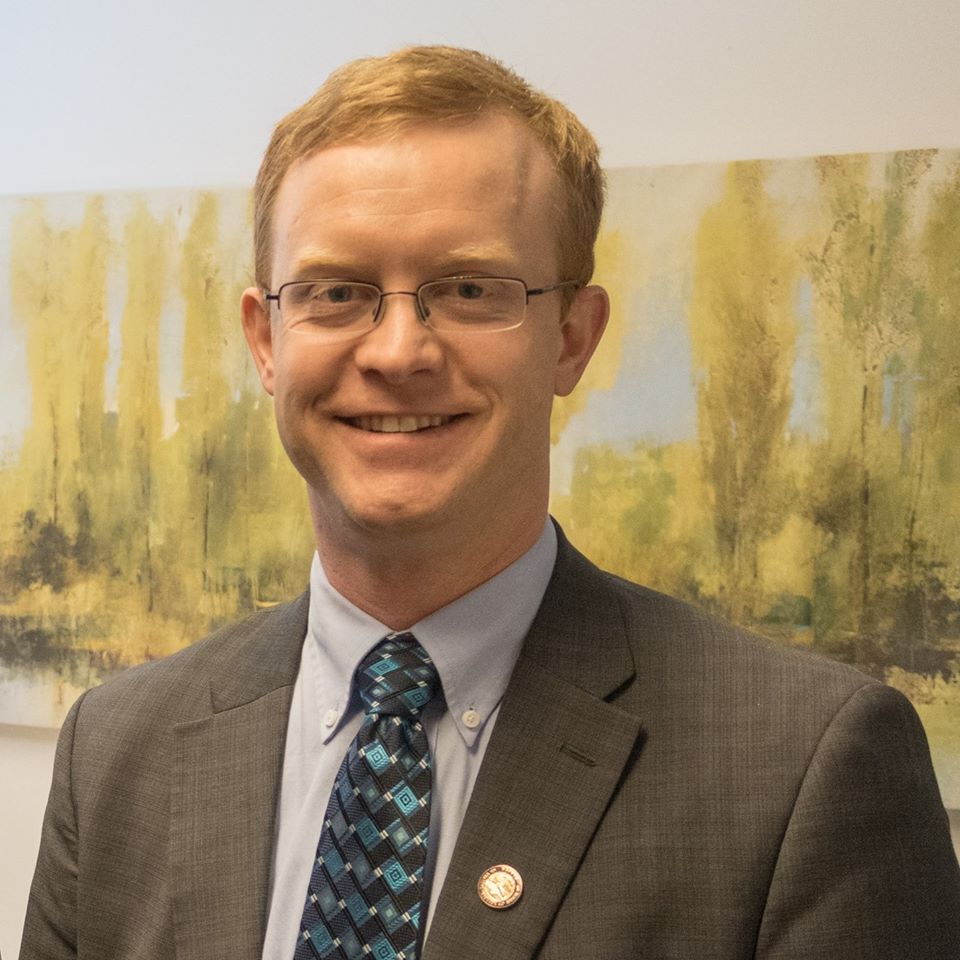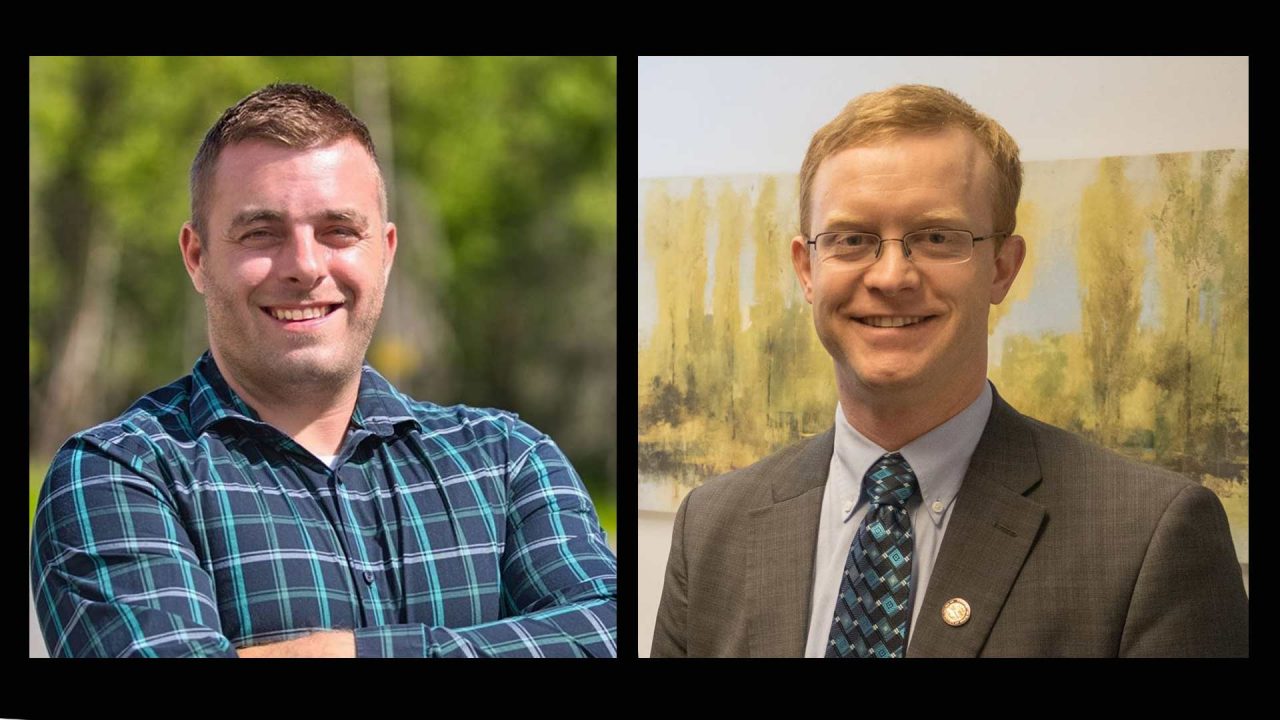
In the race for the Alaska House seat in District 10 (Wasilla), the Alaska Watchman is not making any endorsements. In order to give voters a better idea of how the candidates differ, we sent questions to both incumbent Rep. David Eastman and his Republican primary challenger Jesse Sumner. Their responses are printed below.
Your positions on many key issues for conservatives are very similar to that of your opponent. What do you see as the fundamental difference between you guys?

Jesse Sumner
SUMNER: As you correctly stated, my opponent and I share very nearly identical positions on many, if not all, critical policy issues facing Alaska. The main difference between me and my opponent is how we view the importance of effectiveness and relationships to effect meaningful critical policy changes. I understand that building and maintaining relationships is essential to accomplish a policy agenda. The fact that seven of his Minority Republican colleagues in a non-binding caucus have publicly endorsed me or offered direct assistance illustrates this point.
EASTMAN: If we lived in a socially conservative state, perhaps like one of the states in the Bible Belt, I expect my opponent would vote with the majority on any number of conservative issues. Unfortunately, when you look at the way our state has dealt with social issues, our state policies do not reflect the policies of a socially conservative state, even though many Alaskans would prefer those types of policies.

Eastman
Many Republicans campaign as conservatives, and we send them to Juneau expecting policies to change, but they don’t change. Alaska started out as a Democrat state, and that legacy lingers on in a great number of our state policies. We legalized abortion in Alaska more than 50 years ago, and before 46 other states. Planned Parenthood is one of the dominant political forces in Juneau today. Many Republicans have made their peace with this and choose to focus on policies that Planned Parenthood either doesn’t care about or is neutral towards.
My opponent and I differ greatly in this respect. He has made his peace with the status quo, and is receiving the political support for having done so. Among his supporters in the legislature are socially liberal and moderate Republicans like Rep. Jennifer Johnston, who voted to turn the State House over to Democrats last year, and Rep. Laddie Shaw. Pursuing social conservative policies is not on their agenda. Social conservatives who are willing to go toe to toe with Planned Parenthood are outnumbered in Juneau today. While we are working to make progress in changing that, it will not change with the coming election. Even with the election of a conservative governor like Mike Dunleavy, Alaska will not become like a Bible Belt state in the next few years.
Different candidates will respond to this reality in different ways. The metrics that my opponent and I use to judge success are very different, and in many cases mutually exclusive. He has chosen to highlight the number of bills a legislator passes into law as a key metric that he uses to measure success. He has repeatedly criticized Republican legislators for failing to author bills that have passed in the state house for the past few years. He has also stated publicly that he believes conservative legislators should be voting with House Democrats on the Democrat budget, as it allows them to have more input on policy. While he has stated that he does not plan to join a binding Democrat caucus, these are all the metrics of someone who would want to join. There are only four Republicans in the House who have a bill that has passed in the last two years. All four supported Democrats on key votes and were rewarded with committee chairmanships by the Democrats.
Where my opponent holds up the number of bills passed as a critical metric of a legislator’s success, I hold up the number of bills stopped. We held the line on Red Flag gun control legislation last year. It didn’t pass. We defeated the bill to increase the gasoline tax, and defeated the SB91 catch-and-release crime bill. When conservatives are outnumbered our metrics must match that reality.
When my opponent highlights bipartisan legislation as a metric of success, I have to wonder where the conservative Democrats are that he will work with to pass socially conservative legislation. As I look around, I don’t see any in the state house today, nor do I see any candidates running as Democrats today who fit that description. To stand as a social conservative against the agenda of Planned Parenthood, BLM and the ACLU in Juneau today requires standing on principle, even when other Republican legislators may not be there to stand with you. My opponent has signaled that that is not the kind of fight he is looking for. But that is the fight that awaits conservatives in Juneau. There is the promise of darts and arrows for those willing to stand on the frontlines as social conservatives today. In the Bible Belt it might be different. But things won’t change for the better here in Alaska if we do not have leaders willing to stand on the frontlines, year in and year out, as we work every day to protect the innocent here in Alaska.
Your website highlights a number of issues you will focus on if elected. One of them deals with abortion. Can you list at least two specific types of pro-life legislation would you support if elected?

SUMNER: I have been reviewing the National Right to Life website on state legislation they’ve highlighted. I would either sponsor or co-sponsor the “Heartbeat Bill” introduced this last session by Rep. Vance and cosponsored by 18 other Alaska House members. Sadly, my opponent was not one of them. Another example would be Senator Hughes’ SJR 13 which was a constitutional amendment prohibiting abortion rights, which was drafted by Alaska Family Action.
EASTMAN: The battle to protect those in the womb must reach to the judicial branch of government. Today, the legislature functions as a buttress against any attempt to restrain the judicial activism of Alaska’s liberal judges.
I would support legislation to impeach members of the judicial branch who have usurped legislative power through judicial activism. I would support legislation to ensure that future Alaska governors are able to appoint judges that reflect the will of the people, rather than the will of a handful of attorneys and current judges. I would support legislation bringing state law into line with the right to life expressly recognized in the Constitution of the State of Alaska. I would support legislation to end the taxpayer funding of abortion in Alaska. There are many other Pro-life pieces of legislation that would likely have my support as well. One thing I will not support are bills that give lip service to being pro-life but do nothing to actually further the cause of life here in Alaska.
One of the major obstacles to enacting pro-life laws in Alaska has been the makeup of Alaska judges and specifically the Alaska Supreme Court. According to the Alaska Constitution, the governor can only appoint judges from a list of names he receives from the Alaska Judicial Council, which rarely recommend candidates that are committed constitutionalists. Do you support changing the way judges are appointed in Alaska? How so?

SUMNER: The way judges are selected is critically flawed. If the Alaska Judicial Council is not disbanded, it should be dramatically revised. The challenge we face is that this process is enshrined in the Alaska Constitution (Art. IV, sec. 8). This is a challenge because of the threshold necessary to amend our state constitution (2/3 vote of both bodies of Legislature or a Constitutional Convention).
EASTMAN: I support allowing governors to appoint judges without having to go to the judicial branch to first get permission before doing so. Governor’s should not be limited to only appointing judges who have the support of liberal judges and liberal organizations like the Alaska Bar Association.
Last year, as in past Legislative sessions, the Legislature passed a budget that explicitly states that no money can be used for elective abortions. The AK Supreme Court has ordered the state to pay for them anyway. Would you support the governor if he refused to pay for elective abortions through state Medicaid funds?

SUMNER: I’m proud to be supported by Rep. Cathy Tilton who was the author of that budget amendment and I would gladly support Gov. Dunleavy in enforcing that provision.
EASTMAN: Yes. The governor would have my full support. The Alaska Constitution reserves the appropriation of state monies to the legislature. For the courts to determine what will, and will not, receive state funding, is an unconstitutional overreach of their authority under the Alaska Constitution.
What is your position regarding the binding caucus, and would you join a binding caucus if the Republicans were in the majority?
SUMNER: I will not be bribed or extorted for my vote. The last two years, especially in the Senate, have proven how abusive the practice is. Like my opponent, I have never been a part of a ‘binding caucus”. I have watched how Sen. Shower has been treated and I flatly oppose the practice.

EASTMAN: I helped lead the effort to end the binding caucus before I was elected to the legislature, and continue to do so in the state house. The idea that I could sell the vote of my district to another legislator, or group of legislators, is repugnant to my oath of office and to the people who elected me to serve on their behalf in the legislature. There are times I have stood alone on this issue, but it is not an issue on which there can be negotiation. The existence of a binding caucus will always be to the advantage of special interests in Juneau and to the disadvantage of conservatives. After all, why would you need to bind a conservative legislator to vote against their conscience and against the will of their constituents, unless their vote would violate either their conscience or the will of their constituents?
You also list the right to bear arms as a key issue. What would you do to protect this constitutional right in Alaska?
SUMNER: As someone who EDC, I am very concerned about 2A issues. Two things to come to mind are conceal-carry on University of Alaska campuses and the adoption of an enhanced conceal-carry permit allowing Alaskans to carry in otherwise “gun-free “zones. I believe Arkansas approved that type of permit in 2018, and Alaska should follow suit. I grew up hunting for our vast wildlife resources and guns are an important part of our culture.

EASTMAN: I would make it clear in the law that when you disarm a law-abiding person and deprive them of the ability to protect and defend themselves, you incur legal liability if your doing so results in their being injured. I would ensure that Red Flag laws and ordinances are prohibited in the State of Alaska. I would ensure that laws are followed which forbid State of Alaska resources and employees from assisting with the enforcement of any law, regulation or policy that infringes on the constitutional rights of Alaskans to keep and bear arms for their protection and for the protection of others.
Religious Liberty is under threat around the U.S., but also here in Alaska. Specifically, an LGBT non-discrimination bill was introduced into the Alaska Legislature (HB 82) that would make it a crime for businesses, schools and non-profits to run in accordance with their deeply held beliefs regarding human sexuality. If elected, how would you defend religious liberties in the public square?
SUMNER: Individuals and businesses should not be mandated to do business with people or groups they fundamentally disagree with unless expressly protected by law. A Christian business should not be required to provide goods or services to a Satanist client. That is not all-inclusive, only an example.

EASTMAN: I would ensure that state government and its subdivisions are forbidden from applying religious tests at any point in the decision-making process of government. Government is not competent to determine which religious beliefs are praiseworthy and which are to be condemned. When government caters to the beliefs of a minority and begins to require that everyone adhere to those beliefs, it has overstepped its lawful authority. In order to function as a free society, we must protect the right of individuals to hold disparate views on human sexuality, the origin of life, the human person, psychology, cosmology, and every other field of human endeavor. We will not eradicate evil in the world through government policy, nor will we be able to require righteousness. Any attempt to do so will be met with abject failure.
Even so, a legislator is a very different thing than a king. The status quo is a reflection of where political power resides in Alaska today. Often the role of a legislator is to ask hard questions, and to defeat the lies which permit the status quo to remain the status quo. It can be a slow and difficult journey through swamp-like terrain, with few opportunities to celebrate along the way. Even so, it must be accomplished. And today I am called to that task.
What is your stance on the PFD? How would you propose preserving this Alaska legacy?

SUMNER: I support following the traditional PFD formula unless a change is voted on by Alaskans.
EASTMAN: To Juneau, the PFD represents a way to continue to prop up unsustainable levels of government spending for just a little while longer. To the people of Alaska, it represents a whole lot more than that.
The rule of law must be upheld. Today, it has become increasingly common for our elected officials to set aside the rule of law for political expediency. This should never have been done with the PFD, and we are now reaping the consequences of that error. We must first honor the law, as written, and as the people of Alaska have expected now for four decades. Just government always derives its power from the consent of the people. Therefore, the people must be permitted to have a voice in the future of their dividend. A public vote should be held to permit the people to weigh in on the future of the PFD. It is not acceptable to leave the dividend to the end of the state budgeting process and then simply distribute to the people whatever happens to be leftover. After the above steps have taken place, a constitutional amendment should be passed, after careful deliberation and extensive consultation with members of the public, to firmly establish the dividend for the benefit of future generations of Alaskans.
Many Alaskan families enjoy the incredible educational freedoms. In addition to public schools, we also have state-funded homeschool, private homeschool, private schools and religious schools. What would you do empower parents to choose the education they want for their child?

SUMNER: I support educational choice. I know Gov. Dunleavy championed this issue when he was in the Legislature. Studies have shown that homeschool and private education consistently outperform, in terms of test results, public schools. While homeschooling or private schools are not a real option for many families, we should do everything we can to efficiently maximize educational opportunities for all Alaska students.
EASTMAN: I would begin by eliminating any and all state policies that discriminate against a high school graduate due to the school from which they graduated. Policies that discriminate against homeschool graduates in the area of law enforcement, for example, should be immediately eliminated.
In keeping with the United States Supreme Court’s recent decision relating to the Blaine Amendment, we have the opportunity as a state to step away from this anti-Catholic chapter in our state’s history by amending our state constitution accordingly. There is nothing inferior about a child being educated in a religious or non-religious institution. Every family is unique, as is every child. I believe that educational tax credits, educational savings accounts, and other ways of increasing the ability of parents to more effectively invest in and direct the education of their children should be strongly considered, closely examined, and pursued in such a way as to increase the freedom of parents and families to pursue the educational opportunities that work best for them, even if no one else.
Our state is in a fiscal crisis. Name some specific and concrete measures you support to reduce spending in Alaska?

SUMNER: The absolute number 1 thing we need to do to get our fiscal house in order is adopt a REAL constitutional spending limit. Gov. Dunleavy and Rep. Tilton have led out on this issue. In 1982, Alaskans voted for the current spending limit by a margin of 60-40. Current polling indicates that Alaskans would support a new limit by the same margin. The Majority caucuses in the Legislature have shown little appetite for a new spending limit until the very end of the 2020 session when certain members of the respective Finance committees began recognizing the growing frustration of many Alaskans. Hopefully, we will be able to make some changes to the composition of the 32nd Alaska State Legislature necessary to put this before Alaska voters in 2022.
EASTMAN: We must be constantly in the pursuit of a culture of accountability. The public must be empowered to hold our elected officials accountable, and those elected officials must be empowered to hold our organs of state government accountable. We are a far cry from that type of culture today, which is reflected in both the amount of money we spend as a state, and what we spend it on. A two-year budget cycle is needed to help us break free, as a state, from a culture focused on spending, and always at the expense of Alaska’s future.
State employment contracts must be closely examined by the legislative branch of government. That is not currently taking place. Legislators must track all of our current liabilities as a state. That is not being done.
We need to implement a constitutional spending cap. More than that, our legislators need to establish a process to evaluate our state budget continually throughout the year and from the perspective of performance rather than simply from the perspective of cost. We should look to Texas for a better way of dealing with our state budgeting process.







